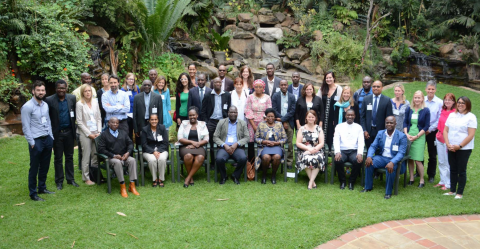Nairobi, Kenya
Tue, 12 Jul 2016 - Sat, 23 Jul 2016
KEY MESSAGES FROM THE MEETING:
- The Roll Back Malaria Global Call to Action to Increase National Coverage of Intermittent Preventive Treatment of Malaria in Pregnancy for Immediate Impact helped to elevate awareness of and prioritization for accelerating actions to increase coverage of IPTp, among global and country level stakeholders. The MiP WG remains committed to supporting these efforts and recognizes the anticipated launch of the WHO ANC guidelines as an important opportunity to reinvigorate country momentum. o The WG will work with countries to review progress to date (since the WHO policy change for IPTp, 2012) and remaining challenges with IPTp uptake, ITN use and case management for pregnant women.
- Tracking coverage of IPTp uptake remains a consistent challenge across countries. The denominator definition- ‘eligible women’ for IPTp is a core factor. o The WG will work closely with WHO and the RBM MERG to develop a short country brief that will support countries in applying, at facility and national level, all WHO MiP supported indicators.
- Country programs shared diverse perspectives and successes. Key commonalities include pervasive SP stock-outs at central and peripheral levels, and deployment of strategies for increasing service utilization including various community-targeted interventions. o The WG recognizes that many countries are making great strides to accelerate MIP but many of these efforts have not yet reached scale including full coverage. The review process with countries (see above) will help to identify what’s working, what’s not and what remains to be done.
- There are clear synergies between WHO’s global strategy for Women’s, Children’s and Adolescents’ Health and WHO’s Global Malaria Program efforts to accelerate efforts to control MiP. The intersection of these efforts is antenatal care and positions countries and global partners to leverage comprehensive support that will lend to better health outcomes for women and their babies.
- Advancing MiP programming and attaining full coverage requires recognition and support for the ‘vulnerable of the vulnerable’. This includes adolescents, women living in rural areas, HIV+ women as well as women of reproductive age, who should be sleeping under an insecticide treated bed-net so that they enter pregnancy protected from malaria.
- Partner-developed tools to facilitate in the implementation of quality MiP services were presented, including the toolkit to improve early and sustained IPTp, the case management job aid, and the MiP Advocacy Guide for National Stakeholders.
- These tools, in addition to other WG advocacy tools, will assist in key efforts to support strengthened implementation of MiP interventions at country-level.
- The WG recognizes that to attain coverage, community interventions that both promote and support services are essential going forward. These efforts are building now in countries like Burkina Faso and are expected to expand in new countries in the next 12-18 months.
- WHO RHR has led the process and updating of the WHO ANC guidelines. An overview of these guidelines was presented to the WG. The WG provided feedback to ensure inclusion of key MiP prevention measures, including promotion of bed-nets and ensuring the promotion of a visit schedule that allows for IPTp1 uptake at 13 weeks.
Resources
- Meeting report, MiP WG Annual Meeting, July 2016
- List of participants, MiP WG Annual Meeting, July 2016
- Meeting agenda, MiP WG Annual Meeting, July 2016
- MIP WG Opening Presentation
- Global Priorities, PMI
- Global Priorities, The Global Fund
- Global Priorities, UNICEF
